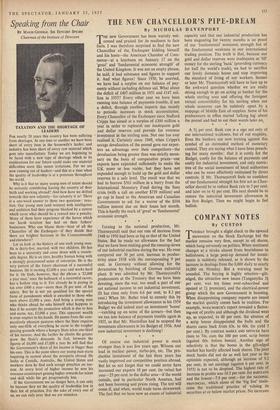Speaking from the Chair THE NEW CHANCELLOR'S PIPE-DREAM
By NICHOLAS DAVENPORT
THE new Government has been warmly wel- comed and praised for its readiness to face facts. I was therefore surprised to find the new Chancellor of the Exchequer kidding himself and his hosts—the American Chamber of Com- merce—at a luncheon on January 17 on the 'great' and 'fundamental economic strength' of the United Kingdom. It was not an empty phrase, he said; it had substance and figures to support it. And what figures! Since 1950, he asserted, we have had a surplus on our balance of pay- ments without including defence aid. What about the deficit of £407 million in 1951 and £147 mil- lion in 1955? Every other year we have been running into balance of payments trouble, if not a deficit, through swollen imports due mainly to periodic increases in stock accumulation. Every Chancellor of the Exchequer since Stafford Cripps has aimed at a surplus of £300 million a year in order to replenish our inadequate gold and dollar reserves and provide for overseas investment in the sterling area. Not one has ever realised it. Certainly since 1949, when Cripps's savage devaluation of the pound gave our expor- ters an advantage over their competitors—the devaluation being greater than was strictly neces- sary on the basis of comparative prices—our exports have expanded sufficiently to make the UK more or less viable, but they have not expanded enough to build up the gold and dollar reserves to a safe level. The result was that we had to borrow $561 million in a hurry from the International Monetary Fund during the Suez crisis (with a call on another $739 million) and go cap in hand to the American and Canadian Governments to ask for a waiver of the $104 million interest due on their loans last month. This is hardly the mark of 'great' or 'fundamental' economic strength.
Turning to the national production, Mr. Thorneycroft said that our rate of increase from 1948 to 1956 had been as big as that of the United States. But he made no allowance for the fact that we have been making good the running-down of our industrial machine during the war. He even compared our 30 per cent. increase in produc- tivity since 1938 with the corresponding 9 per cent. in Germany without allowing for the devastation by bombing of German industrial plant. It was admitted by Mr. Thorneycroft's predecessors at the Treasury that we have been devoting, since the war, too small a part of our net national income to net industrial investment. (It has risen only from 6.6 per cent. to 8.3 per cent.) When Mr. Butler tried to remedy this by introducing the investment allowances in his 1954 Budget we did indeed start an investment 'boom' —catching up on some of the arrears—but then we ran into balance of payments trouble again in 1955, so that Mr. Macmillan had to suspend the investment allowances in his Budget of 1956. And now industrial investment is declining!
Of course our industrial power is much stronger than it was five years ago. Witness our lead in nuclear power, turbo-jets, etc. The pro- ductive investment of the last three years has vastly improved our competitive position abroad. But let us not forget that we could never have increased our exports 10 per cent. (in value) last year-25 per cent. to the dollar area—if the world outside, and in particular North America, had not been booming and prices rising. The test will come if, and when, world trade turns downward. The fact that we have now an excess of industrial capacity and that our industrial production has been stagnating for twenty months is no proof of our 'fundamental' economic strength but of the fundamental weakness in our international trading position. The truth is that, because our gold and dollar reserves were inadequate as 'till' money for the sterling 'bank' (providing currency for half the world's trade), we had to sacrifice our lovely domestic boom and stop improving the standard of living of our workers. Sooner or later Mr. Thorneycroft will have to face up to the awkward question whether we are really strong enough to go on acting as banker for the whole sterling area and offering the foreigner virtual convertibility for his sterling when our whole economy can be suddenly upset by a stoppage of Middle East oil supplies. Some of his predecessors in office started 'talking big' about the pound and had to eat their words later on.
A 5+ per cent. Bank rate is a sign not only of our international weakness, but of our stupidity. Even the bankers are now turning against this symbol of an outmoded method of monetary control. They are saying what I have been preach- ing for many months: that it is costly for the Budget, costly for the balance of payments and costly for industrial investment, and only restric- tive of the social investment of local authorities who can be more effectively restrained by direct controls. If Mr. Thorneycroft feels so confident of our fundamental strength his first act as Chan- cellor should be to reduce Bank rate to 5 per cent. and later on to 44 per cent. His next should be to restore the industrial investment allowances in his first Budget. Then we might begin to feel bullish.


































 Previous page
Previous page